Books on plumbing, electrical, frame con
Folks, I am thinking of designing and building my own house. Since I’ll probably be living in it the rest of my life, and it will probably be the only such effort of my life, I’d like to get it right. Hoping to minimize the “should have’s†that will follow. So, I need to educate myself.
I am looking for recommendations on books or other sources, on the principles of sound construction for residential construction in the northeast (Connecticut). I anticipate that besides the education, the materials will serve as reference materials. For example, in laying out a plumbing system, what are sound practices? What are the principles of electrical wiring layout? What are the considerations for frame construction? What about roofs? Foundations? Etc., etc. I am not looking to become a plumber or an electrician and so forth. My goal is neither to do the most expensive nor the state of the art, necessarily. Rather, it is to do things in intelligent ways.
I am an amateur woodworker, and anticipate that most of the construction will be done by folks who do it for a living. I’ll either GC it myself, or get someone to GC it. I have learned a lot from renovations to my existing house, and many of the things I insisted on doing despite what the trades people told me, turned out to be smart moves. Many people in construction are used to the low cost and good-enough approach. I don’t blame them, because most people don’t want to cough up for the good stuff. I’d rather build a small and simple house without expensive fittings and fixtures, but whatever I do, I’d like it to be robust. I wish I could describe my intent better, but that’s the best I can do.
By the way, “lessons learned†from others who have undertaken such construction endeavors are invited and welcome.
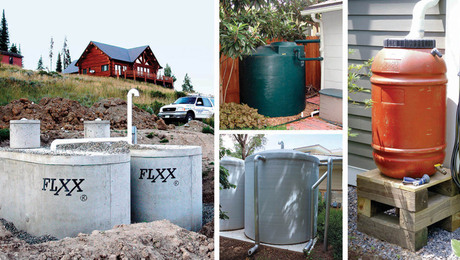


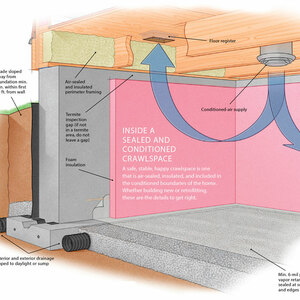

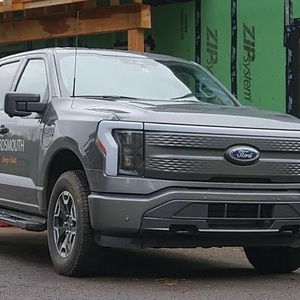



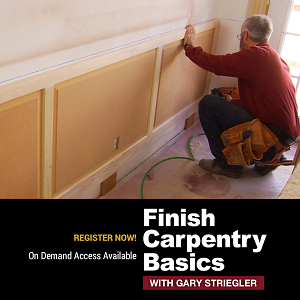





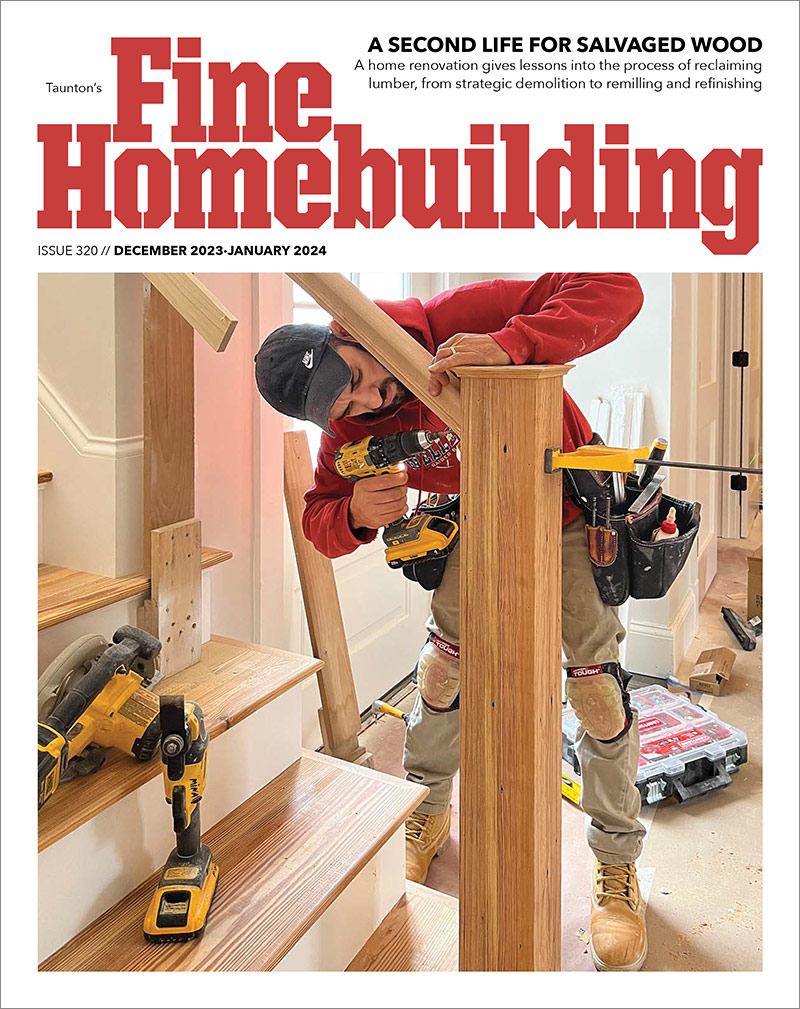
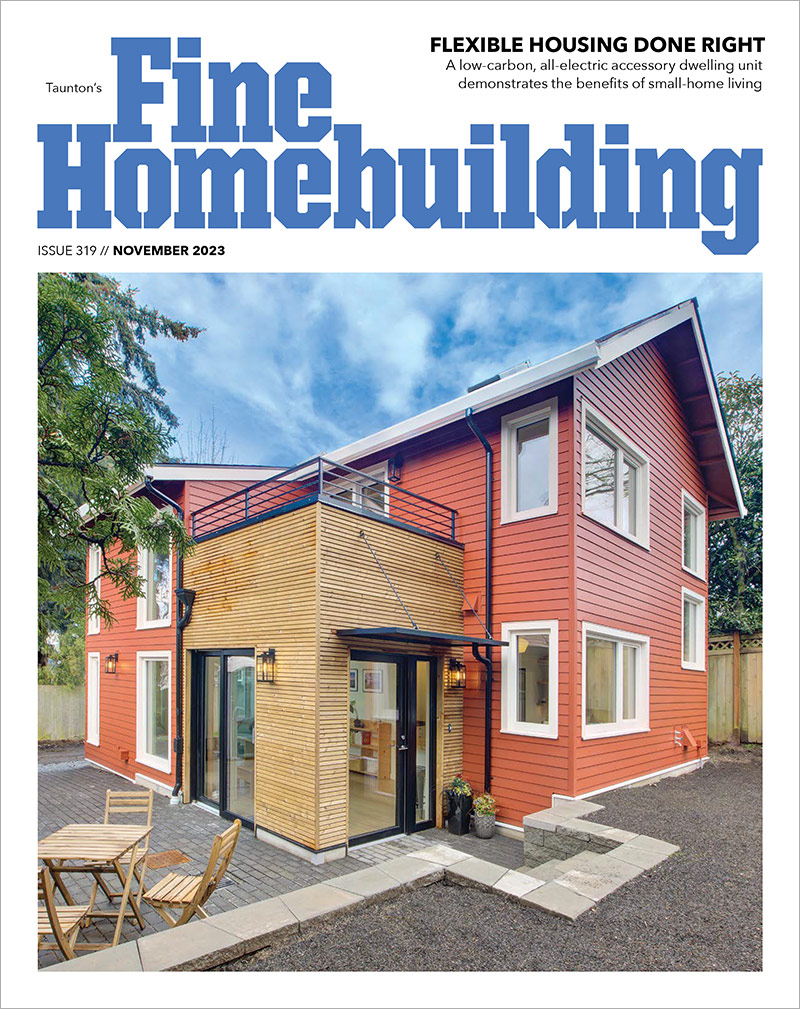

Replies
Click on SHOP TAUNTON at the top.
Tons of books there, lots of good info.
Joe H
anything by taunton press.
Peter Hemp "Plumbing a House" and Rex Cauldwell "Wiring a House" will go a long way toward everything you need to know about plumbing and electrical.
I'd like to take an oppurtunity to publicly thank those who contribute so ofter here and recommend that you try to set aside some time to keep up with this forum, at least for a while. I was a fairly accomplished DIY guy and I'm GCing my own major remodel (+2700 sq ft). I've read 20 taunton books (all very good). But the stuff I've learned here has really put together a lot of non-common knowledge. A lot of very interesting and worthwhile things to be learned. Just stay out of "The Tavern" where you will find out the guy that seems to know everything about subject X is actually an avid Bush supporting war monger or total liberal wacko pontificating the end of the world because Bush is still in office (I hope that is taken as a joke of course...) It's a real buzz killer so I just don't go there.
But seriously, the most important thing I think I learned here is a clear view of life from the "other side". I have a good relationship with all the people I use as my subs because I've learned here the things to avoid and the things that are liked. Listen to these guys, they are honest and hardworking. They aren't out to rip you off and you need to find subs like them. You'll be in good shape since you are trying to do things right, but be careful not to tell the trade guy how to do the work. Nothing wrong with tightly written specs for a job, but be open to ideas and discussion. And ultimately hire someone you trust and defer to them. I go through this a bit with the various trades I have hired. I discuss my ideas, but ultimately I consider it their job and let them make the call. I can't expect them to support an installation if I force them do something my way right? But being able to use this approach requires trust. This is the thing you won't learn from books that you will learn by milling around here.
Get ready for a wild ride GCing your own house. You are guy that has to make sure everything is going right and it sounds like you are starting off well.
MERC.
Thanks for the input, folks. Most of what I have learned about woodworking and about construction is from hanging out and working with the guys who have done stuff on my house, even if small stuff. I have picked up a lot by asking questions, and then listening. So the point made by DJ Merc is well taken.
My biggest concern is about finding good subs. I would have little hesitation to GC myself if I could find the right subs - competent guys with integrity and pride in doing a good job. Other then for accessing a good network of subs, I have no reason to GC my house. I have the time. Plus, the way I am thinking of the construction, I would be able to live in the existing house while the new construction is happening. So I anticipate that there will not be a pressure of time. That is, until my wife gets fed up of the mess!
Thoughts on how to find subs are invited.
When it comes to Sub-Contractors, most Building Departments know the GOOD, the Bad & the Ugly! A good place to start the search, & a good place to be on a first name basis!
from what I seen in home GC. either do all the trade yourself or hire a complete construction company to build your house for you. Gc a house will cost more than a builder. you have no levelage over the sub, they will walk over you. you be like fresh meat to an hungry dog.
What is the difference between a GC and a complete construction company?
This is a small town, all residential with the zoning policy being that we rely on nearby large towns for services. I had been chatting with the building inspector (real nice fellow) several months back, and he was going to put together a list of the good guys, he hasn't got around to it yet. I'll bug him.
It's a gray line because most every firm subs out something. But, a general contractor will regularly use sub contractors and a complete construction company will use them only for real specialities if at all.
I'm surprised the building inspector will draw up a list, because as a government official he's not really supposed to. But, I ask anyway and usually can get some insight by reading between the lines.
Another source to ask is building supply companies. They know what contractors use higher quality materials and are fussy about what they purchase. They hear lots of talk from the business so often have a sense from that too, although that has to be taken with a grain of salt. They also know who pays their bills on time. A contractor sloppy about administration or in financial trouble is best avoided.
There is no substitute for checking references and seeing the quality of their work with your own eyes.
If you are planning to do any of the electrical , plumbing, framing etc. work yourself, you should (must) have both the national and local codes books. Good luck.
I am currently in the middle of doing what you are describing. My wife and I gutted our 550 s.f. house and we're adding 900 s.f. to it as well. We are doing most of the work ourselves (subbed the excavation, concrete, probably will sub the drywall as well). We spent a year and a half reading everything we could get our hands on and designing what we wanted to do. You are in the right place. The resources available through this website are invaluable. I have two bookshelves full of Taunton books and can say without a doubt they are the best publisher in this field. I can't overstate the value of Breaktime either. I have learned so much by checking in every few days and seeing what looks interesting, and have gotten quick answers to questions that I couldn't find answers to elsewhere.It sounds like you are looking to do less of the work yourself and maybe more of the design and supervision. Obviously you can't supervise unless you know how it all works, so I commend you on doing your homework ahead of time. For design, check out Sarah Susanka's "Not-so-Big-House" series. It's a good way to think about how you will actually use the spaces you are building and help you avoid paying to build huge spaces that don't end up getting used.Check out George Nash's "Do it Yourself Housebuilding" (not a Taunton book) for good discussion of different materials and types of construction. It is an older book, so it doen't have the latest materials and construction techniques, but it is a good foundation.For more detailed info if you decide to do some of the work yourself, don't miss Rob Thallon's "Graphic Guide to...(Frame Construction, Interior details, etc.)" series. Excellent detail views for us rookies.I'll second the recommendation of the plumbing and wiring books mentioned above. Also, get "Precision Framing" by Guertin and Arnold, and "Working Alone" by Tom Carroll. They are both fantastic.And last, but definitely not least, keep a subscription to FHB and buy the CD-ROM of the back issues. The Journal of Light Construction is another good magazine resource with back-issue articles available (by subscription) online (worth every penny).Good luck and have fun!-Rich
Rex Cauldwell's Wiring a House is excellent, probably the only electrical book you'd need.
another great book/resource that addresses the whole gamut of building your own house is "The Real Goods Independent Builder" by Sam Clark. Great, great book.